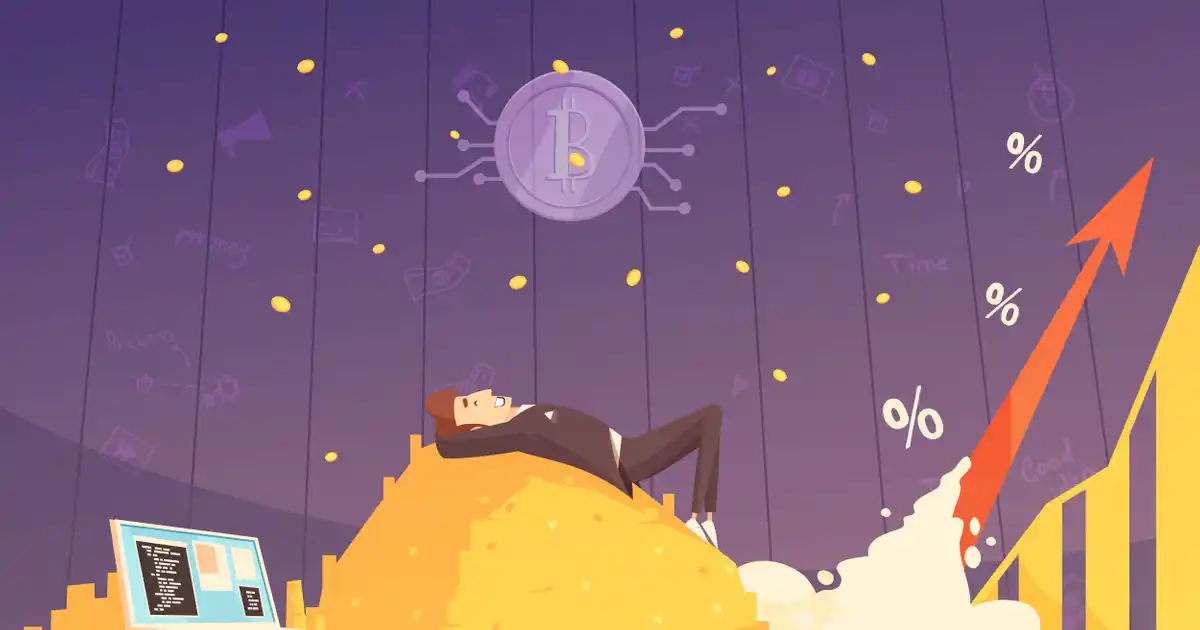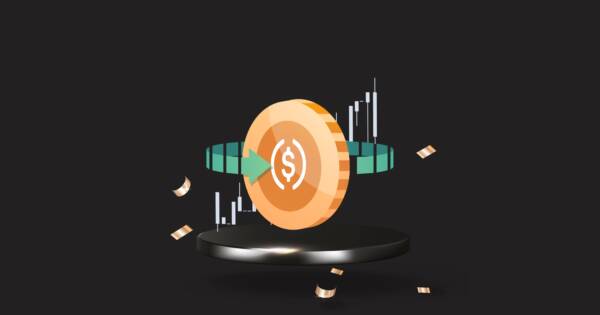- Fidelity Investments recently announced users could put a portion of their 401(k) investments into Bitcoin.
- Bitcoin (and other cryptocurrencies) are emerging and highly volatile digital currencies.
- The wild peaks and valleys of crypto prices make them a poor choice for retirement investing.
For many people, a 401(k) account is a primary means of retirement saving. If an employer offers any sort of financial matching, it’s an even better deal. Your own money — combined with the money your employer contributes — grows tax free until you retire. That growth stems from both consistent contributions, but also from investments.
Whichever financial company handles your 401(k) likely has a variety of investment options. You can allocate certain percentages of your portfolio into tech stocks, precious metals, mutual funds, and even real estate, for example. A more recent trend has seen some people invest a portion of their 401(k) funds into cryptocurrency, with Bitcoin being the most popular choice. But is that really a good idea? Let’s discuss the pros and cons of using your 401(k) to invest in Bitcoin.
What is Bitcoin?
In simple terms, Bitcoin is a digital currency. All transactions are done digitally. Bitcoin is totally unregulated, making these transactions extremely fast and private. The price of Bitcoin also fluctuates wildly. It’s reached highs of about $68,000 USD, but currently sits below $30,000 USD after suffering a massive drop in early 2022.
Bitcoin is created by “mining.” That’s the process of powerful computers solving massive amounts of complex mathematical problems in order to produce a fraction of a Bitcoin. Early Bitcoins were easy to mine, but the process gets harder as the finite limit of Bitcoins looms closer. Bitcoin will only ever produce a maximum of 21 million coins. Once they are all mined, the supply stays finite forever. For more information on Bitcoin, check out our beginner’s guide.
 Shutterstock
ShutterstockBitcoin and 401(k) Investing
Using your 401(k) to invest in Bitcoin is a very new thing. Fidelity Investments announced in April 2022 that it was going to allow workers to put up to 20% of their portfolio (and future contributions) directly into Bitcoin. It’s a totally new offering. Previously, any investments into cryptocurrency would have been made through a separate third-party company or brokerage firm.
We’re sure that other financial institutions that offer or manage 401(k) accounts will quickly follow Fidelity’s lead. It’s a brave new world of investing options for the Average Joe worker. But is this option really a good one?
 Shutterstock
ShutterstockThe Volatility of Crypto
Most investments come with some degree of risk. There are plenty of safer options, although they generally won’t give you a huge return. On the risky end of the scale, cryptocurrency is right at the top of the list. Sure, you might hear people say the stock market is volatile. The Dow Jones and NASDAQ do up and down all the time. But none of those swings compare to the volatility of Bitcoin and its other cryptocurrency cousins.
Cryptocurrencies aren’t tied to a physical asset. Nor are they backed by a government institution, the way the United States dollar is by the Treasury Department. They are subject to the whims of pure speculation, Wall Street tinkering, or grass roots movements from places like Reddit. In the early days, you could buy a Bitcoin for a few hundred bucks. The price rose dramatically to $2,000 at the end of 2017, before falling back to $4,000 a year later.
 Shutterstock
ShutterstockHas Bitcoin Peaked?
The price of Bitcoin started to steadily rise when the pandemic started. It went from roughly $5,000 a coin on March 13, 2020, all the way up to $61,000 a year later. Six months later, it drooped to $31,000 and then shot up quickly to an all-time high of about $68,000. Now it’s back under $30,000. What will it do next? No one really knows.
It could see another surge up. After all, there are only so many Bitcoins available. If demand goes up, but supply stays the same, simple economic theory states the price should rise as well. However, there is also growing skepticism about cryptocurrencies (and their digitally valued brethren, like NFTs). So if demand for Bitcoin tails off, the price could drop further.
The truth is that no one knows what will happen to the price of Bitcoin in the next months or years. If we did, we wouldn’t be writing finance blogs about it.
 Shutterstock
ShutterstockGovernment Warnings
Who wouldn’t want to turn $5,000 into $60,000? Even buying Bitcoin now and hoping to double your money would be an impressive return. Especially when you consider the average stock market return is between 6% and 10% annually. Double your money in 12 months or less? Yes, please!
If only it were that simple.
The U.S. Department of Labor recently issued a statement, warning people about using their retirement money to invest in cryptocurrencies. You can read the whole thing here, but here’s a short summary:
“Don’t, it’s too risky.”
 Shutterstock
ShutterstockDirect Quotes From The Feds
Here are some of governments other major issues with crypto investments:
- Valuation concerns. Financial experts have fundamental disagreements and concerns about how to value cryptocurrencies. These concerns are compounded by the fact that cryptocurrencies are not typically subject to the same reporting and data integrity requirements that apply to more traditional investment products. Scammers have used misleading information to inflate the price of cryptocurrencies, and then sold their own holdings for a profit before the value of the currency drops.
- Obstacles to making informed decisions. These investments can easily attract investments from inexperienced plan participants with expectations of high returns and little appreciation of the risks the investments pose. It can be very hard for ordinary investors to separate fact from hype. When fiduciaries include a cryptocurrency option on a 401(k) plan menu, it signals to participants that knowledgeable investment experts have approved it as a prudent option. This can mislead participants about the risks and cause big losses.
- Prices can change quickly and dramatically. Cryptocurrencies’ prices have been extremely volatile. For example, in just one day last December, the price of bitcoin dropped by more than 17 percent. These large swings can leave participants vulnerable to significant losses.
- Evolving regulatory landscape. Laws and rules are swiftly evolving. For example, the president’s recent executive order directs federal agencies to study risks and policy approaches to digital assets, including cryptocurrency. Changes in the United States and globally may impact existing regulatory frameworks.
 Shutterstock
ShutterstockDon’t Fall For Marketing Pushes
Did you watch the Super Bowl? Most Americans watch at least part of it. If you don’t care for the game, maybe you just tune in for the commercials. It would have been impossible to miss the crypto ads this year, as the industry spent at least $26 million on commercials for the big game.
They brought out the big guns, too. Huge stars like Tom Brady, Larry David, LeBron James, and Matt Damon all invaded our TV screens with basically the same message: if you don’t buy crypto now, you’re going to miss the boat. It’s a simple scare tactic, really. They are trying to activate your FOMO (fear of missing out) triggers. After all, do you really want to be the only one who didn’t buy Bitcoin when all your friends are driving around in Ferraris from their crypto gains?
Don’t fall for it. Like any other risky investment that could make you a lot of money in a short timeframe, you can also lose a lot of money in the same span.
 Shutterstock
ShutterstockSo Never Buy Bitcoin?
We’re not saying to ignore cryptocurrency completely. It’s an emerging new financial oddity, with a lot of money and momentum behind it. It’s absolutely worth keeping a close eye on, especially as people look for ways to hedge their wealth against inflation. However, at this point, investing in Bitcoin is a big gamble. And when you gamble, you have the chance of winning big. Or losing everything.
Since this article is about your 401(k) retirement nest egg, the phrase “losing everything” is not one you want to encounter. If you want to speculate in crypto, we’re not going to tell you otherwise. Just don’t risk your retirement funds on it. The common advice for visiting a casino is to never bet more than you’re willing to lose. With crypto, the same adage holds true. For now, at least.
 Shutterstock
ShutterstockLong Term Investing
When it come to retirement saving, you want to invest for the long term. You shouldn’t be thinking about the gains you could see within a year or two. Instead, you want to focus on steady growth over a couple of decades. So don’t ruin your long-term success by tossing a Hail Mary towards Dogecoin, BitMoon, or whatever else.
Let the power of compound interest work in your favor. Just keeping making regular contributions to your 401(k). Over the years, the interest will grow that money exponentially.
 Shutterstock
ShutterstockRemember Your Retirement Goals
Everyone has slightly different retirement goals. Maybe you want to spend your golden years travelling the globe. Or maybe you just want a quiet life at home, tending to a garden or playing the occasional round of golf. Regardless of your retirement plans, we’re willing to bet that almost everyone shares this single goal: to not have to constantly worry about money.
Once that regular paycheck stops coming in, you’ll need to rely heavily on your 401(k) and other retirement investments for income. The last thing you want is for your nest egg to rise or fall dramatically every few months because some billionaire tweeted out positive or negative things about a cryptocurrency you have a huge stake in.
Retirement should be about stability, so don’t risk your savings on something as volatile as Bitcoin.
 Shutterstock
ShutterstockThe Bottom Line
Crypto investments are enticing, for sure. A handful of early adopters have become “Bitcoin millionaires” when their meager holdings exploded in value 100 times over. It’s hard not to think that you could be next, if you just forked over enough money to buy a sizable crypto portfolio.
However, it’s extremely unlikely that crypto will ever see another explosion like that one. Sure, the price of these coins may end up rising over time. Along the way, though, it looks certain to be a bumpy ride. If you want to set aside some “fun money” to speculate on the latest meme coin, then go again. It could pay off big. Or it might not. Just don’t risk your stable 401(k) retirement account with it.
 Shutterstock
Shutterstock







